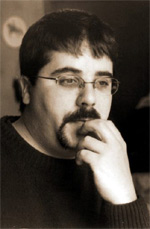Si terminase así el pueblo, resultaría de una fórmula de perfección o de simulación intelectualista
Gabriel Miró
Cuánto tarda el tren en llegar, pensó Gabriel. Moría la tarde en el horizonte, envuelta en un charco de sangre desteñida, y las copas de los árboles más lejanos extendían sus ramas hacia las vías como ancianas artríticas. Cuándo tarda en llegar, pensó Gabriel, y sintió pereza y quiso levantarse, pero se arrepintió en el último momento. Se removió sobre el banco de piedra, inquieto, y miró a un lado y a otro, a la gente que como él esperaba en el andén a que llegara el último tren. Dónde irán todos éstos, pensó, que no tienen más necesidad que la que les crea su avaricia, y volvió su atención a las vías. Una moneda brillaba bajo los rayos del sol, olvidada entre listones de madera, quizá de un viajero que ya no la necesitaba, quizá de un niño que no pudo comprar su helado. Gabriel apoyó las manos a ambos lados de su cuerpo, sintiendo el frío del asiento de piedra en las palmas, y se meció adelante y atrás. No puede tardar ya mucho el tren, se dijo, no me hará esperar mucho más. No dejaba de llegar gente, advirtió mirando hacia las vallas de entrada. Hombres de piel morena y rostros surcados de arrugas; mujeres envueltas en vestidos negros, el pelo cubierto por un pañuelo; niños vestidos con trajes caros o con harapos, el rostro congelado en una mueca triste y seria. Les habían robado incluso la risa de los niños, tan querida y necesitada por todo el pueblo. Los hombres de blanco, con su rostro de cristal y sus armas, les habían arrebatado todo lo que tenían, y ahora les conminaban a marcharse, a abandonar todo lo que una vez había sido suyo. Abandonar el pueblo para siempre en un tren que les conduciría a las calles sucias y oscuras de una lejana ciudad. Los hombres de blanco, con sus falsas sonrisas y sus amenazas veladas. Así debía ser, pensó Gabriel, así debía ser, desde el momento que Tomás decidió volver a casa. Y, mientras esperaba, escuchando el ruido de las voces de los hombres silenciando los llantos de los niños, escuchando el arrastrar de las maletas llenas a rebosar sobre el empedrado de la estación, escuchando los suspiros contenidos de las mujeres al volverse y mirar más allá de las vallas, Gabriel recordó a Tomás, al viejo Tomás, y su terca decisión de volver a ver a su familia.














